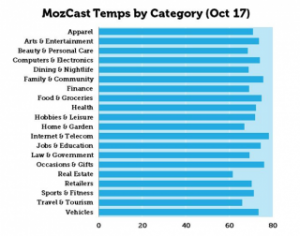Are you prepared for the rise in voice search? Columnist Sherry Bonelli discusses how voice search will impact local businesses.

There’s one thing that remains true about SEO: it’s always changing. One of the big changes that we’re experiencing now in local SEO is the increasing popularity of voice search. Voice search used to be a novelty — now it’s a necessity, especially when you’re on the go with your smartphone or tablet.
If you’re a local business, how do you optimize your business for this new personal assistant-type search? Here are some tips.
Voice searches are on the rise
According to Google, 20 percent of searches on its mobile app and on Android devices are voice searches. The total number of voice searches overall is actually much higher when you take into account personal assistants like Amazon’s Echo (aka Alexa), Google Home (a direct competitor of the Echo), Siri and Cortana — tools that are solely based on voice recognition.
Why the uptick in voice search? First, using your voice to search is getting more accurate. Not too long ago, voice recognition simply wasn’t accurate. In many cases, it was more frustrating than helpful. Now, according to the KPCB Internet Trends 2016 report, the accuracy rate of voice search is up to 92 percent. That’s a huge improvement. As voice recognition becomes more and more accurate, the capabilities of voice search will expand, and consumers will reap the benefits as its popularity continues to rise.
Another reason voice search is becoming more mainstream is that these new devices (like Alexa and Google Home) are bringing voice search to the everyday consumer — and are actually living in your home. (If you tried to find an Amazon Echo to purchase around Christmas time, you know what I’m talking about. There were none to be found.) Consumers have more voice recognition technologies to choose from, and there are sure to be more on the horizon.
So, if you’re going to stay ahead of local search, you need to start thinking about voice search as you optimize your site — starting now.
Optimizing your local business for voice search
Many people use voice search to get information about local businesses they want to go to. They might say something like, “Where is the best pizza restaurant in Chicago?” (Now that’s a tough one!) In this case, you’d want to make sure that you optimize the content on your pages for “best pizza restaurant in Chicago.” Adding natural language to your site’s content will only help you with voice search results.
Another way to add natural language to your website is by creating Q&A pages — using words and phrases that people actually speak (versus words they type into a search box). Make these Q&A pages more conversational in tone, and the keyword phrases you use will probably resonate more with a person performing a voice search.
You also need to make sure that it’s easy for the search bots to crawl your site and know what your business is about. This can increase the chances that your content will show up in response to a voice search question. Make sure you submit your sitemap to Google and Bing. Additionally, start incorporating microdata, schema, rich snippets and so on. These little pieces of code give the search engines even more information about what your business is all about.
If structured data still scares you a bit, check out Google’s Structured Data Markup Helper, where you can see the different kinds of content you can mark up. It will also walk you through the process and make sure you’re including the right HTML on your site.
Now, if a person uses the common local search phrase “near me,” then your on-site optimization probably won’t impact the results much. Instead, the device will look at where the user is physically located when they perform the search and pull up listings that are on Google My Business, Bing Places for Business or other online directories. That’s just another important reason to make sure your business is claimed and optimized — and that your listings are accurate with regard to your business’s name, address and phone number (NAP).
Also, when you’re setting up Google My Business or Bing Places for Business, be as specific as you can when you pick your business category — that can increase the odds of showing up on voice searches that are targeted to your local niche.
In addition to Google My Business and Bing Places for Business, you also want to make sure that your online business directories (aka citation sites) are accurate as well. For instance, if your old address is listed on Yelp, and your new one is on Citysearch, the search engines won’t know which address is the correct one and will be less likely to pull your business up in voice search results.
Small changes: start today
Voice search doesn’t mean you need to overhaul your entire SEO strategy or the content on your site, but it does mean that you’re going to need to make some subtle changes that can help make you more successful in the voice search world.
First, consider the intent behind a voice search. Mobile voice searches will use natural language, which means long-tail keyword phrases are more important than ever. So start brainstorming about what naturally spoken questions may be asked about your business, product or service.
There are some helpful tools that make this brainstorming process easier. Try Answerthepublic.com, StoryBase or Question Samurai (developed by the makers of the great SEO tool, Market Samurai). These tools give you some great natural language keyword phrases that you can incorporate into the content of your site.
Another trick is to take a look at your analytics. Google’s Search Console reports show you what queries are bringing people to your site. At this time, you can’t tell if the search query came from voice search or the good old-fashioned way — but the way voice search is going, that may change. Regardless, you can get some good ideas based on how people are finding you right now.
One final thought
Since most voice searches are done on mobile devices, you MUST have a mobile-friendly site. If a person does a voice search, goes to your site and has a bad experience, you’ve lost! This not only impacts that individual searcher, but a high bounce rate because your site is difficult to use on a smartphone can also (indirectly) negatively affect your rankings on Google. Go mobile, if you haven’t already.
What are your thoughts on voice search? Are you preparing now? I’d love to hear what you’re doing to make your site more voice-search-friendly.
[Article on Search Engine Land.]
Some opinions expressed in this article may be those of a guest author and not necessarily Marketing Land. Staff authors are listed here.
Marketing Land – Internet Marketing News, Strategies & Tips
(88)







